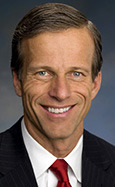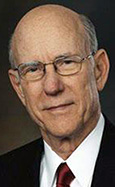Senate bill would block Labor's youth work rule; Visack says migrant youth on large farms the concern
March 22, 2012 | 01:22 PM
By JERRY HAGSTROM
Sens. John Thune, R-S.D., and Jerry Moran, R-Kan., and 36 of their Republican colleagues Wednesday introduced a bill to prevent the Labor Department from enacting a rule to restrict youth labor on farms, while Agriculture Secretary Tom Vilsack said he believes the Labor Department’s major concern is migrant youths working on large farms.
The Labor Department has proposed revising the rule on child labor on farms to reduce the deaths and injuries that occur every year. Labor Department officials have noted that the rule has not been rewritten in 40 years, and Sen. Tom Harkin, D-Iowa, has noted that experts have learned much about youth labor on farms during that period.
A section of the rule that would have made it harder for children to work on the farms of their parents or relatives has already proven so controversial that the Labor Department has withdrawn it for revisions.
But in a news release, Thune and Moran focused on another section of the rule that would make it harder for non-family members under 18 to engage in certain activities that Labor Department officials consider dangerous:
“Last year, DOL Secretary Hilda Solis proposed rules that would restrict family farm operations by prohibiting youth under the age of 18 from being near certain age animals without adult supervision, participating in common livestock practices such as vaccinating and hoof trimming, and handling most animals more than 6 months old, which would severely limit participation in 4-H and FFA activities and restrict their youth farm safety classes; operating farm machinery over 20 PTO horsepower; completing tasks at elevations over six feet high; and working at stockyards and grain and feed facilities. The language of the proposed rule is so specific it would even ban youth from operating a battery powered screwdriver or a pressurized garden hose.”
Solis told Moran at a hearing last week that the final rule will make clear that it does not apply to activities such as operating a battery powered screwdriver.

Sen. John Thune
Moran and Thune said they consider the rule to be an example of the Obama administration’s overreach.
“This is another example of the Obama administration initiating unsolicited regulations that would prohibit normal practices that have been carried out in rural areas for generations — not to mention limiting a desperately needed workforce to replace the current generation of farmers whose average age is nearing 60 years old,” Thune said.
Moran noted that young people have helped family farm and ranch operations for generations.

Sen. Jerry Moran, R-Kan.
“If this proposal goes into effect, not only will the shrinking rural workforce be further reduced, and our nation’s youth be deprived of valuable career training opportunities, but a way of life will begin to disappear,” Moran said.
“This proposal should alarm more than just rural America. If the federal government can regulate the relationship between parents and their children on their own family’s farm, there is virtually nothing off limits when it comes to government intrusion into our lives.”
Thune and Moran noted that they and a bipartisan coalition of 28 Senate colleagues sent a letter to Solis requesting that the proposed rule be withdrawn and outlining numerous concerns, but that DOL has not responded.
Harkin and Solis have said that the Administrative Procedures Act restricts the agency’s ability to respond, and that the senators’ concerns will be taken into consideration in writing the final rule.

Sen. Pat Roberts
Senate Agriculture Committee ranking member Pat Roberts, R-Kan., endorsed the Thune-Moran bill.
“At issue is the DOL interpretation of the ‘parental exemption’ in the proposed rule on child labor in agriculture,” Roberts said in a news release. He also noted that while the department has recently withdrawn that portion, “the threat still remains if the rest of the rule is implemented, which would prohibit youth from participating in basic farm work.”
Roberts noted that Rep. Tom Latham, R-Iowa, has introduced a similar measure in the House.
Meawhile, Vilsack said Tuesday in an interview with AgriTalk radio that he believes the Labor Department is mostly concerned about large-scale commercial farms in which migrant children laborers might be involved.
According to a transcript of the interview provided by Farm Policy, Vilsack said:

Tom Vilsack
“We tried to explain to our friends at Labor that this is a value system, this is how folks teach the rewards of hard work and responsibility, and that parents and grandparents and aunts and uncles are very concerned about the safety of their family, and they make sure that if somebody does something wrong on a piece of machinery that that young person knows about it right away and knows about it in such a way that they’re scared to death and they’ll never do it again.
“What I think the department is trying to get to, and we’re working with them, is on a commercial scale operation, if you have a large-scale workforce and the workface happens to be potentially a migrant workforce, and they don’t have anything to do with their children, and they bring the children to a field, and they have the children work and contribute, is that ... there’s no parent there, in a sense, to be able to — because the parent’s working — to be able to provide those lessons.
“And there are certain practices around grain elevators that I think everybody acknowledges are very, very careful – you have to be very careful. A number of children have died in those grain elevators, and so we want to make sure that there’s safety.”
Vilsack added, “So we’re working with the Department of Labor to make sure that when and if a rule is — and I say when or if — a rule is proposed, that it makes sense, that it’s something that can be understood, it’s something that doesn’t destruct that value system that’s so important ...Their heart was in the right place.
“Everybody wants children to be safe. Nobody’s denying that. It’s just a question of how do you structure it in such a way that you don’t interfere with the family operation and you don’t make it more difficult for children and grandchildren, nieces and nephews to be able to learn the value of hard work on the farm, and that’s what we’re making sure is protected.”
Vilsack also said, “I think there is some reason for concern about some of the practices where we’ve seen a high rate of fatalities. I mean, nobody wants a child to die. And so to the extent that that can be worked on without interrupting the capacity of me to put my grandson on a tractor or my grandson to basically participate in the harvest or planting, that’s what we want kids to be able to do. That’s how the traditions of farming and the value system gets transferred.”
Sens. John Thune, R-S.D., and Jerry Moran, R-Kan., and 36 of their Republican colleagues Wednesday introduced a bill to prevent the Labor Department from enacting a rule to restrict youth labor on farms, while Agriculture Secretary Tom Vilsack said he believes the Labor Department’s major concern is migrant youths working on large farms.
The Labor Department has proposed revising the rule on child labor on farms to reduce the deaths and injuries that occur every year. Labor Department officials have noted that the rule has not been rewritten in 40 years, and Sen. Tom Harkin, D-Iowa, has noted that experts have learned much about youth labor on farms during that period.
A section of the rule that would have made it harder for children to work on the farms of their parents or relatives has already proven so controversial that the Labor Department has withdrawn it for revisions.
But in a news release, Thune and Moran focused on another section of the rule that would make it harder for non-family members under 18 to engage in certain activities that Labor Department officials consider dangerous:
“Last year, DOL Secretary Hilda Solis proposed rules that would restrict family farm operations by prohibiting youth under the age of 18 from being near certain age animals without adult supervision, participating in common livestock practices such as vaccinating and hoof trimming, and handling most animals more than 6 months old, which would severely limit participation in 4-H and FFA activities and restrict their youth farm safety classes; operating farm machinery over 20 PTO horsepower; completing tasks at elevations over six feet high; and working at stockyards and grain and feed facilities. The language of the proposed rule is so specific it would even ban youth from operating a battery powered screwdriver or a pressurized garden hose.”
Solis told Moran at a hearing last week that the final rule will make clear that it does not apply to activities such as operating a battery powered screwdriver.

Sen. John Thune
Moran and Thune said they consider the rule to be an example of the Obama administration’s overreach.
“This is another example of the Obama administration initiating unsolicited regulations that would prohibit normal practices that have been carried out in rural areas for generations — not to mention limiting a desperately needed workforce to replace the current generation of farmers whose average age is nearing 60 years old,” Thune said.
Moran noted that young people have helped family farm and ranch operations for generations.

Sen. Jerry Moran, R-Kan.
“If this proposal goes into effect, not only will the shrinking rural workforce be further reduced, and our nation’s youth be deprived of valuable career training opportunities, but a way of life will begin to disappear,” Moran said.
“This proposal should alarm more than just rural America. If the federal government can regulate the relationship between parents and their children on their own family’s farm, there is virtually nothing off limits when it comes to government intrusion into our lives.”
Thune and Moran noted that they and a bipartisan coalition of 28 Senate colleagues sent a letter to Solis requesting that the proposed rule be withdrawn and outlining numerous concerns, but that DOL has not responded.
Harkin and Solis have said that the Administrative Procedures Act restricts the agency’s ability to respond, and that the senators’ concerns will be taken into consideration in writing the final rule.

Sen. Pat Roberts
Senate Agriculture Committee ranking member Pat Roberts, R-Kan., endorsed the Thune-Moran bill.
“At issue is the DOL interpretation of the ‘parental exemption’ in the proposed rule on child labor in agriculture,” Roberts said in a news release. He also noted that while the department has recently withdrawn that portion, “the threat still remains if the rest of the rule is implemented, which would prohibit youth from participating in basic farm work.”
Roberts noted that Rep. Tom Latham, R-Iowa, has introduced a similar measure in the House.
Meawhile, Vilsack said Tuesday in an interview with AgriTalk radio that he believes the Labor Department is mostly concerned about large-scale commercial farms in which migrant children laborers might be involved.
According to a transcript of the interview provided by Farm Policy, Vilsack said:

Tom Vilsack
“We tried to explain to our friends at Labor that this is a value system, this is how folks teach the rewards of hard work and responsibility, and that parents and grandparents and aunts and uncles are very concerned about the safety of their family, and they make sure that if somebody does something wrong on a piece of machinery that that young person knows about it right away and knows about it in such a way that they’re scared to death and they’ll never do it again.
“What I think the department is trying to get to, and we’re working with them, is on a commercial scale operation, if you have a large-scale workforce and the workface happens to be potentially a migrant workforce, and they don’t have anything to do with their children, and they bring the children to a field, and they have the children work and contribute, is that ... there’s no parent there, in a sense, to be able to — because the parent’s working — to be able to provide those lessons.
“And there are certain practices around grain elevators that I think everybody acknowledges are very, very careful – you have to be very careful. A number of children have died in those grain elevators, and so we want to make sure that there’s safety.”
Vilsack added, “So we’re working with the Department of Labor to make sure that when and if a rule is — and I say when or if — a rule is proposed, that it makes sense, that it’s something that can be understood, it’s something that doesn’t destruct that value system that’s so important ...Their heart was in the right place.
“Everybody wants children to be safe. Nobody’s denying that. It’s just a question of how do you structure it in such a way that you don’t interfere with the family operation and you don’t make it more difficult for children and grandchildren, nieces and nephews to be able to learn the value of hard work on the farm, and that’s what we’re making sure is protected.”
Vilsack also said, “I think there is some reason for concern about some of the practices where we’ve seen a high rate of fatalities. I mean, nobody wants a child to die. And so to the extent that that can be worked on without interrupting the capacity of me to put my grandson on a tractor or my grandson to basically participate in the harvest or planting, that’s what we want kids to be able to do. That’s how the traditions of farming and the value system gets transferred.”